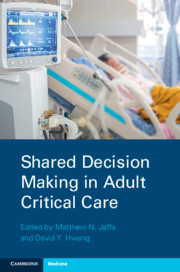Book contents
- Shared Decision Making in Adult Critical Care
- Shared Decision Making in Adult Critical Care
- Copyright page
- Dedication
- Contents
- Contributors
- Preface
- Chapter 1 When Does Shared Decision-Making Apply in Adult Critical Care?
- Chapter 2 How Much Does the Family Want to Be Involved in Decision-Making?
- Chapter 3 Show Me the Data
- Chapter 4 Communication Skills for Critical Care Family Meetings
- Chapter 5 The Do-Not-Resuscitate Order
- Chapter 6 The Do-Not-Intubate Order
- Chapter 7 Prolonged Ventilator Dependence for the Pulmonary Patient
- Chapter 8 Renal Replacement Therapy
- Chapter 9 Shared Decision-Making during Extracorporeal Membrane Oxygenation
- Chapter 10 Hypoxic–Ischemic Brain Injury after Cardiac Arrest
- Chapter 11 Decompressive Craniectomy for Stroke Patients
- Chapter 12 Decompressive Craniectomy for Traumatic Brain Injury Patients
- Chapter 13 Severe Traumatic Spinal Cord Injury
- Chapter 14 Potentially Inappropriate Treatment and Conscientious Objection
- Chapter 15 Shared Decision-Making in Emergent Situations
- Chapter 16 Advance Directives
- Chapter 17 Care of the Unbefriended Patient
- Chapter 18 The Role of Palliative Care in the Intensive Care Unit
- Chapter 19 Measuring and Evaluating Shared Decision-Making in the Intensive Care Unit
- Chapter 20 Brain Death Discussions
- Index
- References
Chapter 17 - Care of the Unbefriended Patient
Published online by Cambridge University Press: 27 May 2021
- Shared Decision Making in Adult Critical Care
- Shared Decision Making in Adult Critical Care
- Copyright page
- Dedication
- Contents
- Contributors
- Preface
- Chapter 1 When Does Shared Decision-Making Apply in Adult Critical Care?
- Chapter 2 How Much Does the Family Want to Be Involved in Decision-Making?
- Chapter 3 Show Me the Data
- Chapter 4 Communication Skills for Critical Care Family Meetings
- Chapter 5 The Do-Not-Resuscitate Order
- Chapter 6 The Do-Not-Intubate Order
- Chapter 7 Prolonged Ventilator Dependence for the Pulmonary Patient
- Chapter 8 Renal Replacement Therapy
- Chapter 9 Shared Decision-Making during Extracorporeal Membrane Oxygenation
- Chapter 10 Hypoxic–Ischemic Brain Injury after Cardiac Arrest
- Chapter 11 Decompressive Craniectomy for Stroke Patients
- Chapter 12 Decompressive Craniectomy for Traumatic Brain Injury Patients
- Chapter 13 Severe Traumatic Spinal Cord Injury
- Chapter 14 Potentially Inappropriate Treatment and Conscientious Objection
- Chapter 15 Shared Decision-Making in Emergent Situations
- Chapter 16 Advance Directives
- Chapter 17 Care of the Unbefriended Patient
- Chapter 18 The Role of Palliative Care in the Intensive Care Unit
- Chapter 19 Measuring and Evaluating Shared Decision-Making in the Intensive Care Unit
- Chapter 20 Brain Death Discussions
- Index
- References
Summary
“Unbefriended,” or “unrepresented,” patients are those who are unable to make their own decisions with regard to their medical care and lack an available surrogate decision maker. As we discuss in this Chapter, many terms have been used to refer to this heterogeneous group, although none fully encompass the breadth of clinical scenarios that present in critical illness; we use “unbefriended patient” for consistency. This unfortunate situation may occur because the person is truly without close contacts or those contacts are unable to be contacted to make these critical decisions on behalf of the patient. Patients without available surrogates but with clearly documented goals of care have variably been included or excluded from this cohort. Although these scenarios may, at first glance, seem to be at the edges of the management spectrum, they are not uncommon. In two studies, 16% of patients who were admitted to the intensive care unit (ICU) and 5.5% of patients who died in the ICU were without surrogates.1,2 The care of these individuals strains the legal, ethical, and practical limits of our work and must be explored by both individual physicians and their institutions.
- Type
- Chapter
- Information
- Shared Decision Making in Adult Critical Care , pp. 149 - 156Publisher: Cambridge University PressPrint publication year: 2021



